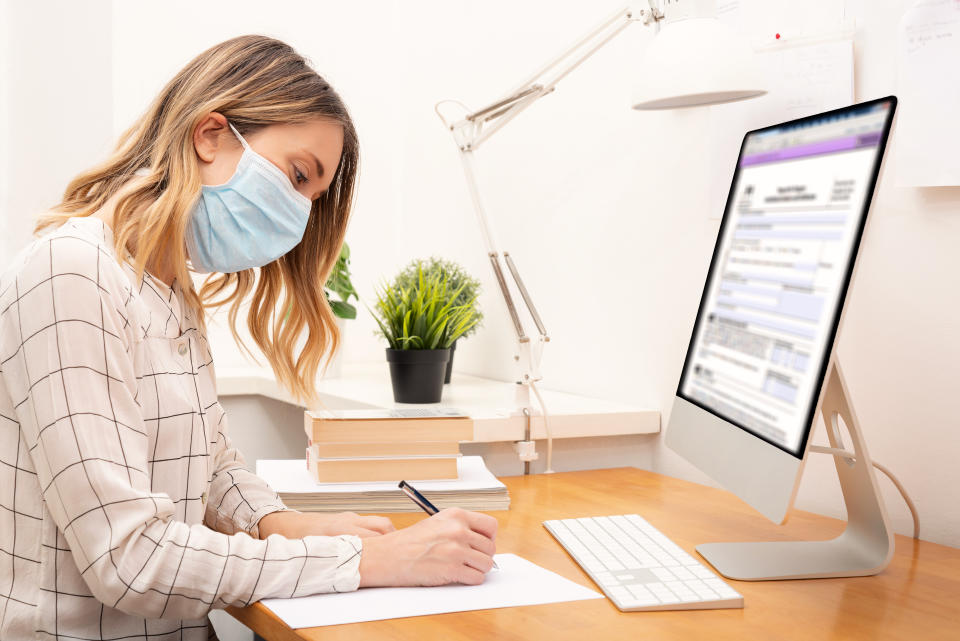Coronavirus: How to avoid burn out if working from home

Millions of workers throughout the UK have been forced to set up office at home in an attempt to combat the coronavirus outbreak.
Boris Johnson has introduced draconian measures that only allow people to go in if it is unavoidable, like NHS staff and delivery drivers.
The blurred home-office environment combined with a lack of a commute may tempt workers to put in extra hours.
With the World Health Organization (WHO) recognising “burn out” as a “syndrome”, one expert worries overdoing it may trigger a set of health problems unrelated to the infection.
Early research suggests the coronavirus is mild in four out of five cases, however, it can lead to a respiratory disease called COVID-19.

The WHO defines burn out as “a syndrome conceptualised as resulting from chronic workplace stress that has not been successfully managed”.
This leads to low energy, “feelings of negativism or cynicism” towards your job and reduced “efficacy” at work.
Latest coronavirus news, updates and advice
Live: Follow all the latest updates from the UK and around the world
Fact-checker: The number of COVID-19 cases in your local area
Explained: Symptoms, latest advice and how it compares to the flu
The symptoms may sound vague, however, Brendan Street – “head of emotional wellbeing” at Nuffield Health – claims there are key warning signs to look out for:
Struggling to put things in perspective: Endless thoughts racing through your head may leave you feeling helpless. As burn out progresses, even minor problems can feel insurmountable
Mood swings: Burn out can trigger outbursts of anger or irritation. Left unchecked, anxiety, panic attacks and depression can set in
Feeling drained: Rather than taking time to relax, your work may be all you think about. Not switching off from time-to-time can lead to headaches and fatigue
Fear of delegating: Wanting to have control over every task, no matter how small, is a sign of burn out
Constantly checking emails: Logging on late at night takes away from time spent relaxing
Coronavirus: How to combat burn out
A certain degree of stress is perhaps inevitable.
A global pandemic is an unprecedented event in all our lives, with many struggling to adjust to the new “normal”.
Others may feel financially vulnerable, while the fear of catching the virus could lead to health anxiety.
Experts have stressed people should take time out to run a bath, go for a walk or call a friend.
When it comes to burn out, Street claims simple tips can stop people feeling frazzled:
Speak to your boss: Make a list of what you suspect is triggering your burn out, whether it be unrealistic deadlines or an unmanageable workload. Arrange a virtual chat with a more senior member of staff to talk these through
Know your rights: If your boss is unsupportive, consider going to HR. The European Court of Justice ruled in May 2019 employers must take steps to ensure staff are not exceeding the 48-hour maximum working week and are taking adequate breaks
Trust your team: Let colleagues get on with the job they were hired to do, rather than feeling like everything is your responsibility
Schedule downtime: Book in breaks like you would meetings. While we cannot socialise in person, arrange phone catch-ups or try meditating
Stick to a set working day: Don’t add on time you would normally spend commuting and take a proper lunch break
Use the support on offer: Many businesses have workplace support, like employee assistance programmes. These offer direct, confidential contact with experts who support individuals on everything from emotional distress and family issues to work-related problems and addiction

What is the coronavirus?
Since the coronavirus outbreak was identified, more than 1.9 million cases have been confirmed worldwide, according to Johns Hopkins University.
Of these cases, over 458,100 are known to have “recovered”.
Globally, the death toll has exceeded 119,700.
The coronavirus mainly spreads face-to-face via infected droplets expelled in a cough and sneeze.
There is also evidence it may be transmitted in faeces and can survive on surfaces.
Although most cases are mild, pneumonia can come about if the coronavirus spreads to the air sacs in the lungs.
This causes them to become inflamed and filled with fluid or pus.
The lungs then struggle to draw in air, resulting in reduced oxygen in the bloodstream and a build-up of carbon dioxide.
The coronavirus has no “set” treatment, with most patients naturally fighting off the infection.
Those requiring hospitalisation are given “supportive care”, like ventilation, while their immune system gets to work.
Officials urge people ward off the coronavirus by washing their hands regularly and maintaining social distancing.




